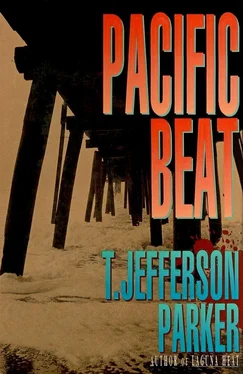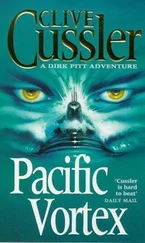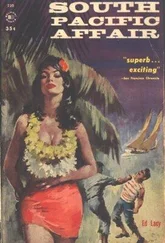“ ‘Forgiveness.’ ”
Jim knocked, then let himself into Virginia’s room. She was sitting at her vanity, staring straight ahead into the mirror. She was in her robe and her yellow hair was unknotted and hung past her shoulders. She looked ancient. Jim saw her eyes move to his reflection.
“Are you okay?” he asked.
“Yes. Does that matter to you?”
“Sure it does.” He stood there for a moment, then went to the bed and sat. Her eyes followed him across the glass. He looked around the room, unchanged since the departure of Poon a decade ago. Ann’s words rang in his head, but it took him a long time to speak. “If it matters, I forgive you,” he said.
“Why?”
“It’s the best thing I’ve got left.”
Virginia stared at him in the mirror. “I will not accept that forgiveness in this house. I will not permit it.”
“It needed to be said.”
“What good do the words do?”
“Maybe they help. Maybe there’s nowhere else to start. Maybe they’re just for me.”
“Then you have to live without them, Jim. I choose to.”
Weir stood, then sat back down. Virginia’s gaze followed him in the glass. “How’d you get so hard, Mom? Did something happen... I mean, was it Jake, or Dad, or... what?”
She looked down at her hands, then back into the mirror at Jim. “Twenty-four years ago, I looked at myself in this same mirror and I decided then that I would never forgive myself. This is my version of honor. It wasn’t long after I’d given up my daughter’s only child for adoption, after telling her it had been stillborn. Time doesn’t diminish a thing like that — it only compounds it.”
“There must be a better way to live a life.”
She continued to stare at him. “Do you know what Poon said to me when we found out Annie was pregnant and it was too late for an abortion? He said he thought that David and Ann should just get married like they wanted to. Or have the child and get married later. Or give them Sweetheart Deal and let all three of them sail around the world and be young and stupid together. ‘It doesn’t matter what people think,’ he told me. ‘I know a lot of people, he said, and there’s not one whose opinion I care enough about to give a shit what they think. Fuck ’em all if they can’t take a joke,’ he said — that was your dad’s creed.”
Jim smiled to himself. Poon had had a way of getting to the nub of things. At heart, he was an outlaw. Does a man ever get over missing his father? “I don’t suppose that flew with Blake Cantrell very well.”
Virginia held his stare in the mirror. When she spoke next, her voice was taut with anger. “Blake Cantrell said the same thing. So did his wife.”
Jim tried to figure it but couldn’t. “Why couldn’t you just let it happen?”
“Because a person has convictions. They’re there and you can’t move them. Deep in my heart, I believed that it was wrong, that what he had done to Annie was wrong. I believed that no Cantrell was good enough for a Weir — especially not my only daughter. They were rich, corrupt people. I believed it was my duty to protect Annie above all else. I would have done anything for her. I would have gladly laid down my life. So I prevailed. I have always prevailed.”
Jim sat for a long while, watching the minutes march by on the digital bed-stand clock. Each one was portrayed in isolation: no future, no past, only the present. That is a lie, he thought — that is not the way time moves. Just look at her.
Slowly, Jim began to realize why his mother could never accept anybody’s absolution. It was only partially to do with taking her daughter’s baby and giving it away. That was something she had done according to the imperatives inside her. Rather, it had more to do with what Virginia herself understood about those imperatives. Virginia had known she was wrong. Even while she was making the arrangements in New York, she had known she was wrong. She had sacrificed her daughter’s happiness — in the end, perhaps, her life — to principles she knew were less important than the needs of love and the living. To accept forgiveness — even her own — would be an admission she could never make, at least not with words. Instead, largely by her own design, she would acknowledge her guilt every day for the rest of her life in the eternally wounded form of Joseph Weir — a declaration without sound, the ultimate Weir confession.
Jim stood. “I love you, Mom.”
“I can honestly say that I love you, too. More than you will ever know. And I’ll try with all my might to learn to love him, too — Joseph. For Annie. But I won’t accept your forgiveness. Don’t ask me to do that. Give it to someone who deserves it.”
Weir turned off the light in his room and went downstairs. He stole quietly through the front door, locking it behind him.
The night was clear and the stars looked as if they were just a few inches above the rooftops. The bay was a black dance floor upon which the ferries waltzed and the houselights jitterbugged without sound. There was still, in all of this, the power to move him.
His stride lengthened on the sidewalk. At Becky’s he stopped outside the hedge and peered toward the house. No lights were on. He went through the gate and shut it gently behind him, but the little brass bell chimed anyway, betraying Jim’s presence in spite of himself. For a moment, he stood there, adopted by the oleander, a shadow part of larger shadows. My silence has been a lie. Jim yanked the bell string twice, hard, sending a pure and truthful sound into the night. Then his heart was beating fast and he was taking the stepping-stones across Becky’s yard two at a time. The porch light came on and the screen door was opening.












